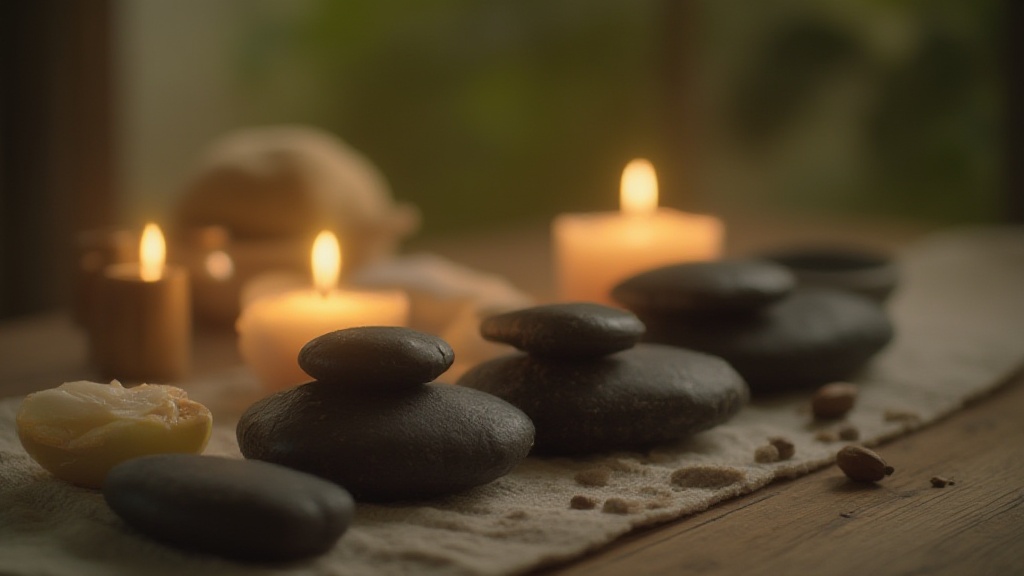
Massage therapy serves as a powerful holistic approach to enhancing overall health and wellness. Its multifaceted benefits, including improved physical and mental well-being, are recognized in various wellness programs.
Therapeutic touch not only alleviates pain but also fosters emotional wellness, which is essential for a balanced life.
By incorporating massage therapy into wellness routines, individuals experience increased muscle recovery and effective tension release, ultimately leading to enhanced wellbeing.
This natural healing method promotes body awareness, encouraging more people to explore its advantages.
Stress Relief Through Massage Techniques
Recognizing the impact of stress on mental health is fundamental. Massage techniques are effective for achieving stress relief and improving overall mental health.
Research shows that massage therapy decreases cortisol levels, which are associated with stress, while simultaneously increasing serotonin and dopamine, two hormones that uplift mood. Specific techniques known for their efficacy in reducing stress include:.
- Swedish massage: This technique utilizes gentle strokes to facilitate relaxation and enhance circulation improvement.
- Deep tissue massage: Recognized for its focus on chronic muscle tension, it significantly aids in tension reduction.
- Aromatherapy: Integrating essential oils during the massage enhances relaxation and promotes mindbody connection.
- Trigger point therapy: This method targets specific muscle knots, contributing to effective pain relief strategies.
Research indicates that consistent massage therapy can lead to significant improvements in sleep quality and anxiety reduction.
Integrating these massage techniques into wellness therapy offers a comprehensive strategy for achieving emotional balance and fostering an overall state of relaxation. The benefits extend beyond mere comfort, as they contribute significantly to pain management and promote holistic health.

How Does Massage Aid Pain Management
Massage therapy significantly enhances pain management by effectively linking stress relief to reduced pain perception. Research illustrates that the process of relaxing tightly held muscles encourages a profound sense of comfort, which is particularly beneficial for chronic pain conditions.
Studies have shown that individuals suffering from conditions like arthritis or fibromyalgia frequently experience decreased pain levels through regular massage treatments.
When selecting the right type of massage, consider options such as deep tissue massage for severe tension relief or Swedish massage for overall relaxation.
Always consult with healthcare providers to tailor the best treatment plan for individual pain levels.
Exploring Holistic Health Benefits Of Massage
Incorporating massage therapy into personal wellness strategies plays a significant role in holistic health, which promotes overall well-being beyond just physical symptoms. This approach allows individuals to enhance both emotional and physical wellness simultaneously.
To integrate massage into a holistic wellness routine, it’s beneficial to schedule regular sessions that align with personal health needs. Combining massage therapy with practices like yoga or meditation amplifies relaxation, reduces tension, and improves circulation.
Such synergistic methods foster a deeper mind-body connection, ultimately supporting immediate health while building a foundation for long-term vitality and resilience.
Massage Therapy
- Studies show that regular massage can significantly reduce pain levels in individuals with chronic conditions like arthritis and fibromyalgia.
- Massage therapy promotes relaxation, which can lower stress levels and enhance pain perception.
- Combining massage with practices such as yoga or meditation can improve overall wellness and foster a stronger mind-body connection.
- Deep tissue massage is particularly effective for relieving severe muscle tension, while Swedish massage is ideal for general relaxation.
Muscle Recovery: The Role Of Massage
Massage significantly impacts muscle recovery, emphasizing its role in wellness strategies. Studies suggest that sports therapy can enhance athletic performance, reducing recovery time by up to 30%.
This improvement occurs because massage enhances circulation, allowing more oxygen and nutrients to reach fatigued muscles, ultimately facilitating quicker healing.
Specific techniques are notable for their efficacy:.
- Swedish massage: Ideal for relaxation and overall rejuvenation.
- Deep tissue massage: Effective for relieving persistent tension and pain.
Incorporating these methods post-exercise can optimize recovery, enabling athletes to maintain peak performance levels while alleviating the stress resulting from rigorous training.
Emotional Wellness And The Healing Touch
Addressing the benefits of therapeutic touch reveals its substantial effects on emotional wellness. Regular massage therapy represents a viable strategy for alleviating symptoms of stress and anxiety, fostering a sense of comfort and relaxation. Research indicates that these psychological benefits of touch not only improve mood but also enhance emotional balance, promoting overall mental health.
Incorporating Massage into Self-Care Routines
Individuals can enrich their self-care by scheduling consistent massage sessions. This approach allows the integration of effective relaxation techniques into daily routines. Consider the following strategies for maximizing benefits:
- Prioritize regular massage appointments to establish a routine.
- Practice mindfulness during sessions to enhance the experience.
- Utilize essential oils or aromatherapy for added relaxation.
These efforts contribute to a greater sense of wellbeing and emotional resilience, demonstrating the profound connection between physical and mental health.
Massage and Recovery
- Massage can reduce recovery time by up to 30% for athletes.
- Enhanced circulation from massage allows for better oxygen and nutrient delivery to muscles.
- Regular massage therapy can alleviate symptoms of stress and anxiety.
- Incorporating mindfulness during massage sessions can enhance relaxation and overall experience.
Effective Relaxation Techniques With Massage
Integrating massage into your daily routine significantly enhances stress management. Various relaxation techniques, such as Swedish and deep tissue massage, stimulate physiological responses that are necessary for alleviating tension.
These methods trigger the relaxation response, which encourages a sense of calm while reducing muscle tightness.
Incorporating these practices can lead to improved emotional wellness and comfort.
Consider setting aside time each day for self-massage or scheduling professional sessions. This approach not only promotes relaxation but also supports overall wellbeing, contributing to a balanced lifestyle that effectively combats daily stressors.
- Utilize aromatherapy during sessions to enhance relaxation.
- Incorporate hot stone therapy for deeper muscle relief.
- Practice trigger point therapy to address specific pain areas.
Improving Circulation For Overall Wellbeing
Enhancing circulation improvement plays a significant role for optimal health and links back to the principles of holistic health and muscle recovery. Massage therapy enhances blood flow, promoting oxygen and nutrient delivery throughout the body. Improved circulation correlates with better energy levels and faster recovery times, making it essential for a healthy lifestyle.
To boost circulation at home, engage in self-massage techniques, using foam rollers or balls to target muscles. Regular practice enhances blood flow and facilitates relaxation, which further supports muscle recovery and overall wellbeing. For an effective routine, try the following techniques:
- Apply essential oils during self-massage for added benefits.
- Incorporate mindfulness to enhance the massage experience.
- Utilize bodywork techniques to improve flexibility and range of motion.
Massage and Wellbeing
- Studies show that regular massage can lower cortisol levels, reducing stress and anxiety.
- Massage therapy has been linked to improved circulation, which is essential for nutrient delivery and muscle recovery.
- Incorporating relaxation techniques like aromatherapy can enhance the overall effectiveness of massage sessions.
- Research indicates that self-massage techniques can lead to increased flexibility and reduced muscle soreness.
Can Massage Enhance Sleep Quality
Massage therapy can significantly enhance sleep quality. Research indicates that the relationship between stress relief and sleep is profound, as massage not only alleviates tension but also promotes emotional wellness.
Studies demonstrate that massage reduces cortisol levels, which correlate directly with improved sleep patterns.
By engaging in regular massage therapy, individuals often experience better overall well-being, positively influencing both the onset and duration of sleep.
To optimize the benefits of massage for sleep enhancement, consider implementing a pre-sleep routine that incorporates techniques such as Swedish massage or aromatherapy.
These methods are known for their ability to foster relaxation. Here are some actionable tips for a pre-sleep massage routine:.
- Choose a calming environment with soft lighting.
- Incorporate soothing scents, such as essential oils, to enhance the experience.
- Focus on areas of tension, utilizing therapeutic touch to promote relaxation.
- Practice mindful breathing during the massage to further calm the mind and body.
Creating a peaceful atmosphere is essential to maximizing the therapeutic benefits of massage.
By integrating these strategies, individuals can significantly improve their sleep quality, leading to a revitalization of both physical and mental health.
- Massage therapy has been shown to reduce cortisol levels, which are linked to stress and sleep disturbances.
- Regular massage can improve overall well-being, positively affecting sleep onset and duration.
- Techniques like Swedish massage and aromatherapy are effective in promoting relaxation before sleep.
- A calming environment and mindful breathing during massage can enhance its therapeutic effects on sleep quality.
